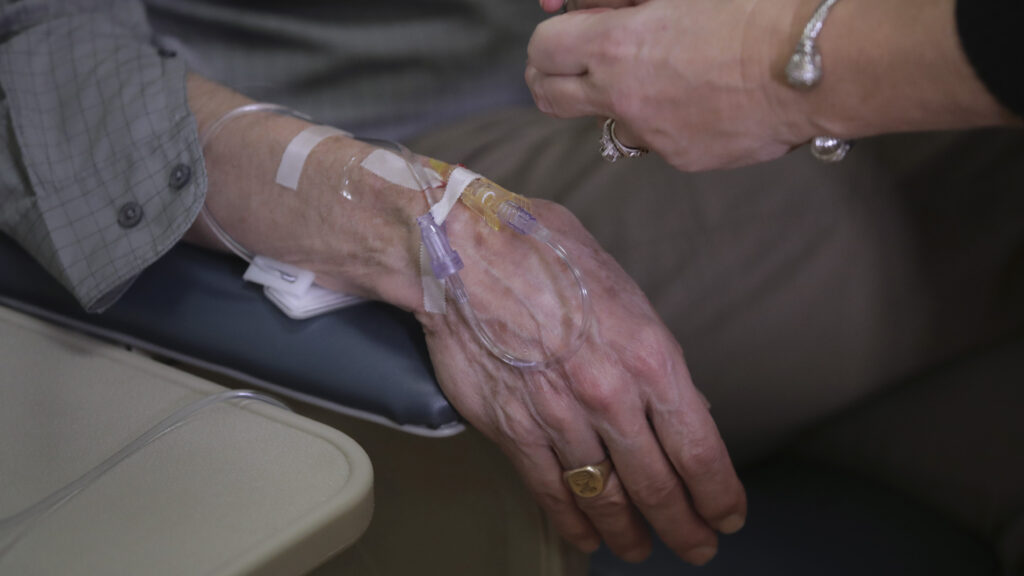Biogen said Thursday that it expects to begin a large clinical trial next May to confirm the benefits of the Alzheimer’s disease treatment Aduhelm, pending clearance from U.S. regulators.
The trial, a condition of Aduhelm’s Food and Drug Administration approval, could answer some outstanding questions that have kept many neurologists from prescribing Biogen’s drug. But it’ll be years before the company has data to show.
The study will enroll more than 1,300 patients with early-stage Alzheimer’s from the U.S. and internationally, Biogen said, comparing Aduhelm to placebo over the course of 18 months. Other details about the trial design, including endpoints, are not being disclosed at this time, a spokesperson added.
advertisement Based on prior experience, Biogen expects the trial to take about four years to complete, meaning the company won’t have data until 2026. That’s still five years faster than Biogen’s initial timeline for the confirmatory study, which was hammered out between the company and the FDA when Aduhelm was approved in June. At that time, FDA officials were criticized for giving Biogen a nine-year deadline to produce definitive evidence on whether or not Aduhelm can slow the cognitive decline associated with Alzheimer’s.
advertisement Biogen’s prior pivotal trials, both terminated early, led to divergent results. In one, Aduhelm was no better than placebo at slowing patients’ cognitive and functional decline. In the second, the drug charted a small but statistically significant benefit. Looking at data from both studies, Biogen concluded that patients who got a high dose for an extended period of time did better than those on placebo. The FDA, which approved Aduhelm over the objections of its independent advisers, came to agree.
Aduhelm has been a commercial disappointment since then. Payers have balked at its list price, averaging $56,000 a year per patient, while physicians have fervently questioned whether Biogen’s supporting evidence merited FDA approval, let alone widespread use. Aduhelm, once forecast to be a blockbuster product, brought in just $300,000 in its first full quarter after approval.
Biogen’s next trial, if positive, could boost Aduhelm’s standing. But the Alzheimer’s treatment landscape might be markedly different by the time Biogen has data from its confirmatory study.
Eli Lilly expects to submit a rival medicine called donanemab for FDA approval in early 2022, which means Aduhelm could face competition later that same year. On Wednesday, Lilly executives said that their own confirmatory study is already fully enrolled, and the results are expected in 2023.
Lilly is also running a head-to-head study to determine which medicine is better at clearing toxic plaques from the brain and a study in patients who do not yet have symptoms of the disease. In an interview, Daniel Skovronsky, Eli Lilly’s chief scientific officer, said that Aduhelm’s approval has not, so far, hurt Lilly’s ability to run its own studies as experts feared.
‘Doctors and patients were banging down our doors to get in the trial because there was so much news about Alzheimer’s disease and amyloid plaque and donanemab,’ Skovronsky said.
Biogen is awaiting Phase 3 data on another Alzheimer’s treatment of its own, called lecanemab. Results of that study are expected in the middle of 2022.
In the meantime, Aduhelm’s commercial fate rests with Medicare, which next year will make an all-important decision on whether and how widely to pay for the drug. A draft ruling is expected in January, followed by a final decision in the spring.
— Matthew Herper contributed reporting
https://www.statnews.com/2021/12/16/as-aduhelm-faces-doubts-biogen-plans-another-pivotal-trial-for-2022/
